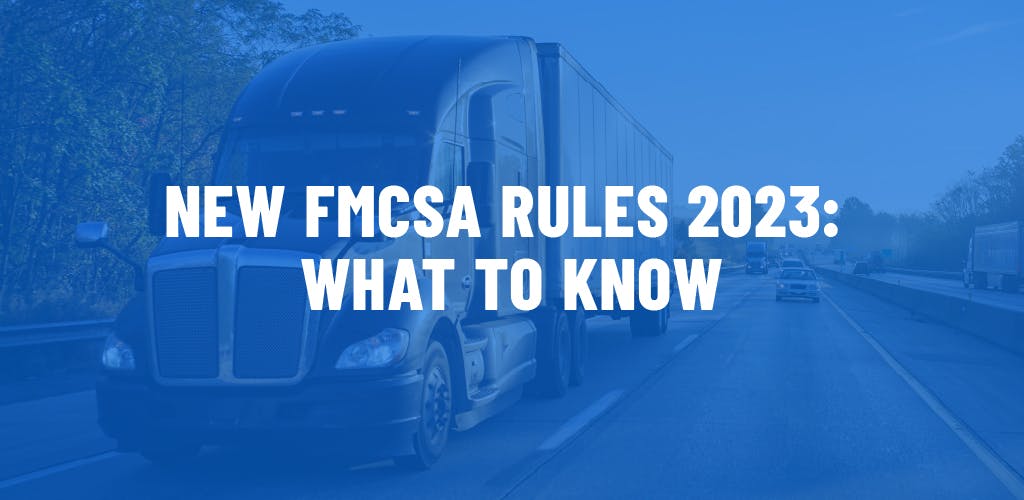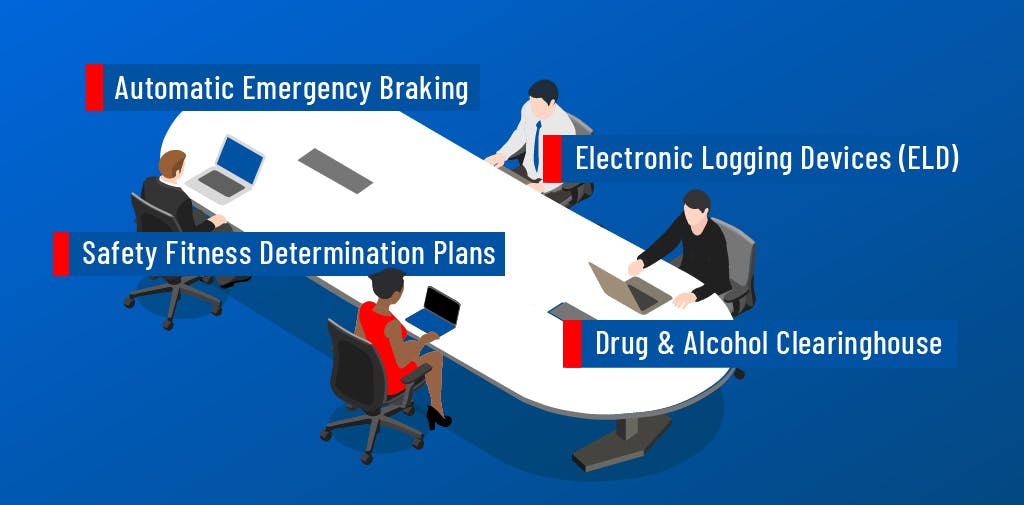New FMCSA Rules 2023: What to Know
May 18th, 2023

The trucking industry is an integral part of the American economy, responsible for transporting goods across the country. As such, regulations governing the industry are essential for ensuring safety and efficiency. The Federal Motor Carrier Safety Administration (FMCSA) plans to implement new FMCSA rules in 2023 that will have a wide-ranging impact on the trucking industry.
These changes aim to improve the safety and efficiency of the trucking industry, while also addressing concerns about driver safety. As the FMCSA continues to monitor and update trucking industry regulations, the industry is poised for continued growth and success. Let’s take a look at what you need to know as information develops.
What is the FMCSA and Why is it Important?
Staying informed of FMCSA rule changes is essential for maintaining legal compliance, improving safety standards, and staying ahead in the competitive trucking industry.
The FMCSA is a branch of the US Department of Transportation (DOT) responsible for regulating commercial motor vehicles and their drivers. The agency’s mission is to reduce crashes, injuries, and fatalities involving large trucks and buses.
The FMCSA sets and enforces trucking industry regulations, including driver qualification standards, hours of service (HOS) rules, and vehicle maintenance requirements. The agency also conducts safety audits and inspections of carriers to ensure compliance with federal regulations.
The importance of the FMCSA lies in its role in ensuring the safety of the traveling public and promoting the efficiency of the trucking industry. By enforcing strict safety standards and holding carriers and drivers accountable, the agency helps to promote motorist safety.
FMCSA Updates for 2023
In 2023, an implementation of a number of new FMCSA rules and DOT trucking regulations that will impact the trucking industry.
One of the most significant changes is the implementation of electronic logging devices (ELDs) and HOS regulations. Another major change is the implementation of a new drug and alcohol testing program.
The new FMCSA rules are designed to improve safety in the trucking industry. The implementations will all add to the cost of doing business for trucking companies. The FMCSA rule changes will also make it more difficult for truck drivers to find jobs.
The trucking industry is already facing a number of challenges, including a shortage of drivers and rising fuel costs. The FMCSA rule changes will only add to these challenges. Many see the future of trucking will take on a number of consolidations and bankruptcies in the years to come.

FMCSA Rule Changes 2023
New FMCSA Updates in 2023 aim to improve road safety and reduce accidents but may also result in increased costs and changes in operations for fleet owners. Adjustments to scheduling, logistics, and compliance measures may be necessary to ensure adherence to the new FMCSA rules. Staying informed and proactively adapting to these changes will be crucial for fleet owners to maintain compliance and efficient operations in the ever-evolving landscape of the trucking industry.
Prepare to carefully navigate to successfully adapt safe and compliant operations. Here are some of the FMCSA rule changes:
Automatic Emergency Braking
Automatic Emergency Braking (AEB) systems identify when a truck is in risk of colliding with the vehicle in front of it and automatically brake if necessary. DOT’s National Highway Traffic Safety Administration (NHTSA) reported 20 automakers were committed to making AEB a standard on their future vehicles.
For vehicle safety, dynamic brake support and crash-imminent braking will require truckers to also ensure they’re up with DOT tire regulations to cause less severe crashes and save lives.
Publications will be released by the FMCSA to further update the public, expected near Summer 2023.
Drug and Alcohol Clearinghouse
The FMCSA clearinghouse will become the sole query source for employers to meet the requirement to identify prospective drivers with drug and alcohol offences on January 6, 2023.
Before, carriers were required to seek past employment for drug testing history and search the Clearinghouse database.
While this saved time, employers must still contact other DQ file required history. DOT Regulation 49 CFR Part 391.23 specifies what DOT expects on an employment verification report.
The DOT generally requires employers to verify an applicant’s safety performance history with their previous employers for at least the last three years, including commercial driving history, within 30 days.
Safety Fitness Determination Plans
The present three-tier federal rating system of “Satisfactory, Conditional, and Unsatisfactory” will be replaced by a proposed Safety Fitness Determination (SFD) rule from 2016.
The rule will apply to any federally regulated commercial motor carrier that received a single “unfit” determination, requiring the carrier to either improve operations or shut down.
FMCSA intends to collect data on how it can more effectively identify “unfit” trucking companies and remove them from conducting hauls.
They will do so by soliciting public feedback on the use of existing safety data, including inspection data, in establishing carrier fitness to operate, as well as potential adjustments to the current three-tier safety fitness rating structure.
Electronic Logging Devices (ELD)
FMCSA rules require most new commercial trucks to have ELDs. ELDs are designed to improve safety by ensuring that truck drivers are not driving while fatigued. The FMCSA rule changes also impact fleet owners by requiring them to provide ELDs to their drivers and to keep records of their drivers’ hours of service.
Compliance with these rules is essential to avoid penalties and maintain regulatory compliance. Overall, the implementation of ELDs as per the new FMCSA rules brings modernization and standardization to the industry, benefiting both drivers and fleet owners. However, it may also require initial investment in ELDs and training for drivers and staff to ensure smooth adoption of changes. For more details, visit the ELD Fact Sheet on the FMCSA site.
FMCSA News
To keep up with the latest FMCSA news and DOT trucking regulations updates, see the FMCSA newsroom for developing information.
Frequently Asked Questions
Where can I find the latest FMCSA news and updates related to the trucking industry?
Resources and news updates on FMCSA news and other industry-related topics can be found on their website for guidance on how to navigate new developments.
What steps should trucking companies take to ensure compliance with the updated FMCSA regulations?
To ensure compliance with updated FMCSA regulations, trucking companies should take the following steps:
- Stay informed: Trucking companies should regularly check the FMCSA website, industry publications, and other relevant resources to keep up with the latest regulatory updates and changes.
- Maintain accurate records: Have systems in place to keep records updated at standard and readily accessible if needed.
- Conduct internal audits: Regularly conducting internal audits can help companies identify areas of non-compliance and proactively address them before they become a problem.
How will the new FMCSA rule changes affect trucking companies and drivers?
One of the most significant changes is the updated HOS rules, which increase flexibility for drivers while maintaining safety standards. The new rules include changes such as expanding the short-haul exemption and allowing for more split-sleeper berth time. Compliance with these new regulations will require proactive effort and ongoing training and education.
Stay Compliant with the Help of Hale Trailer
Keeping up with all of the rules, regulations, and changes can be difficult. To stay up to date on FMCSA news, critical compliance and licensing suggestions, our team of experts are available to help you with services and support to keep you safe and compliant. Get ready to hit the road by reaching out to Hale Trailer or visiting one of our locations today.
All the information on this website – https://www.haletrailer.com – is published in good faith and for general information purposes only. Hale Trailer Brake and Wheel does not make any warranties about the completeness, reliability and accuracy of this information. Any action you take upon the information you find on this website, is strictly at your own risk. Hale Trailer Brake and Wheel will not be liable for any losses and/or damages in connection with the use of our website.
